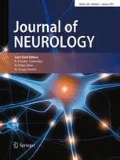Dear Sirs,
After a long and severe disease, Prof. Dr. Dr. h.c. Dipl. Ing. Frank Lehmann-Horn passed away in May 2018. He dedicated his life to study the mechanisms of rare inherited neurological disorders, mainly those affecting skeletal muscle, which are caused by genetic mutations in ion channel encoding genes. Together with his collaborators Reinhard Rüdel and Kenneth Ricker, in the early 80s he discovered that ionic conductances of skeletal muscle fibers biopsied from patients with myotonia or periodic paralysis were altered compared to normal muscle fibers. This early pioneering work was a crucial contribution to identify the first ion channel disorders which to date comprise a large spectrum of diseases affecting particularly excitable tissues, such as muscle and nerve cells, but also all other cell types in which ion channels play an important role.
From 1992 to 2010, Frank Lehmann-Horn was Professor for Physiology and Head of the Department of Applied Physiology at Ulm University, Germany. Since 2008, he became a Senior Professor for Neuroscience funded by the Hertie Foundation and headed the Division of Neurophysiology at Ulm University from 2008 to 2018. For his work, he received many awards including the Science Award of the city of Ulm 1995 and the Gaetano Conte Award 2004. In 2003, he received an honorary doctorate from Debrecen University for his achievements and was initiated into the Heidelberg Academy of Science in 2009.

Frank Lehmann-Horn was a mechanical engineer, passionate scientist and a physician always caring for his patients. This combination enabled him to think from different angles about diseases and let him discover basic principles of physiology and disease mechanisms on which basis he also discovered new therapies. One of his greatest successes in this regard is described in his last article published in this issue of the journal. It reports about a patient with hypokalemic periodic paralysis, who was wheelchair-bound since her 8th year of life and regained walking 10 years later after identifying the diagnosis, understanding the reason for the permanent weakness and initiating the right therapy. Thanks to his work, channelopathies are now found in medical textbooks and patients still benefit from his findings.
Holger Lerche, Karin Jurkat-Rott, and Marc-André Weber
Author information
Authors and Affiliations
Corresponding author
Ethics declarations
Conflicts of interest
The authors report no conflicts of interest.
Ethical approval
All human studies have been approved by the appropriate local ethics committee and have been performed in accordance with the ethical standards laid down in the Declaration of Helsinki. Informed consent was obtained prior to inclusion in the study.
Rights and permissions
About this article
Cite this article
Lerche, H., Jurkat-Rott, K. & Weber, MA. Obituary for Prof. Dr. Dr. h.c. Dipl. Ing. Frank Lehmann-Horn. J Neurol 266, 1803 (2019). https://doi.org/10.1007/s00415-019-09304-1
Received:
Accepted:
Published:
Issue Date:
DOI: https://doi.org/10.1007/s00415-019-09304-1

